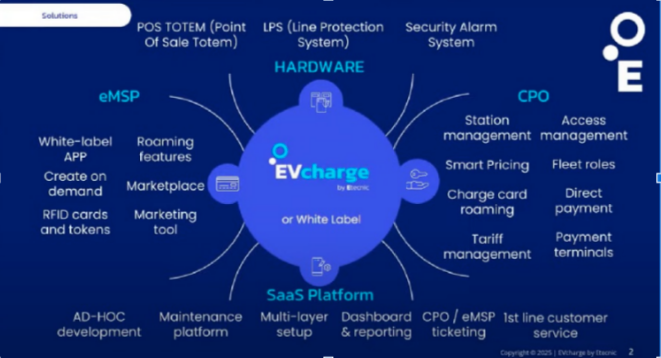Electric vehicle drivers display a typical fossil fuel user behaviour: they always seek the lowest rate.
In this context, Charge Point Operators (CPOs) face the challenge of offering the most competitive price at any given time of the day, thereby attracting as many drivers as possible.
How can they achieve this?
The tool that makes it possible is Smart Pricing, a dynamic pricing system powered by artificial intelligence that adjusts tariffs in real time according to multiple variables.
This solution analyses factors such as available photovoltaic production, energy storage costs, user behaviour, and vehicle flow, to offer adjusted prices based on the origin of the energy.
“Smart Pricing was born out of the need to track the real cost of energy in order to set competitive prices and thus attract as many drivers as possible,” says Llorenç Porquer, Sales Account Manager at EVcharge and responsible for France and Europe.

During EVcharge Day, organised by Mobility Portal Europe, Porquer explained the benefits of this tool to stakeholders in the electromobility sector.
“While some companies maintain fixed tariff models, based on pre-established energy contracts or digital wallet systems, EVcharge proposes a radically different approach that allows CPOs to differentiate themselves from the competition,” he asserts.
This model is complemented by an additional strategic component: interoperability, meaning that chargers are visible and available across multiple networks.
“A German tourist, for instance, might not find an Italian charger if it is not integrated into interoperable networks. But if the system is connected through OCPI, the app will display available stations, thus increasing the likelihood of being chosen,” he explains.
This multi-network visibility enhances the user experience and increases charger utilisation opportunities.
Finally, it is worth mentioning that the Smart Pricing solution was recently selected as a finalist for The smarter E AWARD 2025, in the E-Mobility category.
EVcharge will present this and other innovations from 7 to 9 May during the Power2Drive Europe trade fair in Germany, aimed at CPOs and Electric Mobility Service Providers (EMSPs).
How does Smart Pricing track the real cost of energy?
In today’s energy transition scenario, electricity may come from different sources: the grid, solar panels, or batteries.
These batteries, in turn, may have been charged with solar or grid energy.
This web of energy origins complicates traceability and creates a sort of “energy chaos” that is hard to manage.
That’s where Smart Pricing comes into play.
Through artificial intelligence algorithms, it tracks in real time the actual cost of energy, identifies its origin, calculates battery charge status, and determines the source of the available energy.
“For example, on a sunny day, panels may generate energy while no users are charging, allowing the batteries to fill. But at night, when demand arises, that energy comes from the sun, via the battery,” explains Porquer.
EVcharge combines this energy traceability with demand forecasts and variable costs, to adjust in real time the price shown to users.
In this way, the application indicates to the driver which station offers the best rate at each moment.
Is investing in software worthwhile?
Although a slowdown in electromobility was recorded globally last year, sector investment remained strong.
Regarding charging stations, initial expenditure is mainly concentrated in hardware and installation.
Subsequently, fixed energy charges, electricity supply costs, and routine maintenance are added.
Software appears last, but it can have a key impact on profitability.
“The cost is minimal compared to other factors, and the return on investment is high,” assures Porquer.
He adds: “Sometimes clients believe software is expensive, but when we show them the business case, they realise it’s not.”
Ultimately, the basic needs for efficient operation in electric mobility are clear: maximise charger availability, optimise revenue, reduce operational costs, and improve the user experience.
A comprehensive solution for every role in the EV charging ecosystem
EVcharge presents itself as a complete, adaptable, and scalable platform for EV charging infrastructure, integrating specific functionalities for each of the key actors in the ecosystem.

This is affirmed by Juanma Pérez, Sales Manager of the company, who explains that they offer solutions for every part of this infrastructure: hardware, software, CPO, and eMSP.
For eMobility Service Providers, EVcharge has developed a range of tools aimed at enhancing charger visibility, enabling interoperability with other platforms, and fostering user loyalty through personalised management.
Among its features are white-label apps customisable on demand, roaming functionalities through OCPI network integration, RFID cards and tokens, the possibility of building a proprietary marketplace, digital marketing tools, and on-demand service creation options.

This allows eMSPs to operate with a strong brand identity, without relying on external developments, and with high technological autonomy.
Regarding hardware, EVcharge has designed three key solutions addressing both operational needs and regulatory requirements.
The first is a centralised payment system known as POS TOTEM, developed by the company and offered as a white-label product.
“This solution allows for grouping chargers from different manufacturers in a single physical location, which is particularly relevant under regulations such as AFIR, which requires all chargers above 50 kW in Europe to include payment terminals,” explains Pérez.
At the same time, the company developed a surveillance system with video cameras aimed at preventing DC cable theft, a problem frequently affecting high-power charging points.
Additionally, the Line Protection System (LPS) enables neutral energy management at a site, integrating different sources such as solar panels, batteries, or the grid, and thus adapting to distributed generation and self-consumption schemes.
For CPOs, EVcharge offers a set of tools designed to optimise daily operations and improve the user experience.
These tools allow for managing charging stations and access to them, configuring roles within electric fleets, applying Smart Pricing dynamic pricing, setting flexible tariffs, and facilitating roaming for charging cards.
Moreover, the platform allows for the implementation of direct payment methods and the connection of chargers to physical terminals, integrating different equipment under a single architecture.
The fourth and final component of EVcharge’s offering is its SaaS platform, which centralises all operations in a remote digital management environment.
This cloud-based solution enables custom developments according to each client’s needs, facilitates maintenance task management, and offers multi-level configuration for different user profiles.
It also includes a real-time data dashboard, automatic report generation, a ticketing system for technical support for both CPOs and eMSPs, and a first-class customer service.








